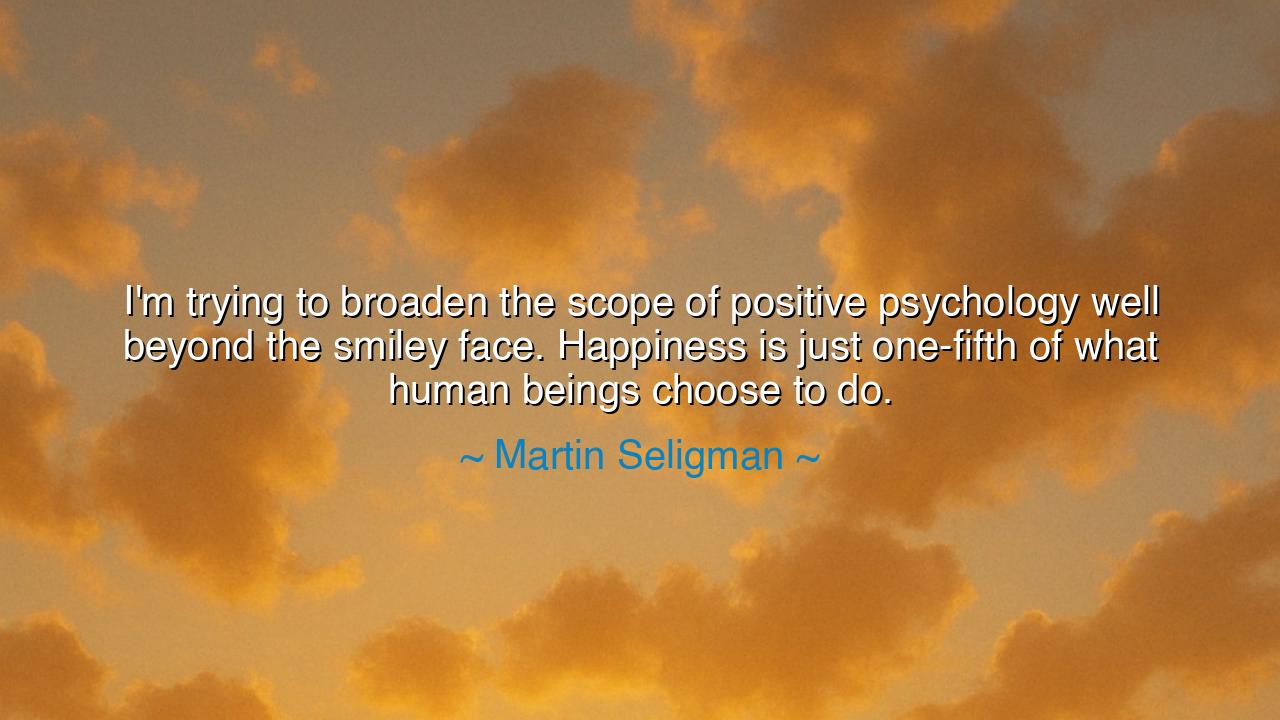
I'm trying to broaden the scope of positive psychology well
I'm trying to broaden the scope of positive psychology well beyond the smiley face. Happiness is just one-fifth of what human beings choose to do.






“I’m trying to broaden the scope of positive psychology well beyond the smiley face. Happiness is just one-fifth of what human beings choose to do.” So spoke Martin Seligman, a philosopher of the mind and a seeker of the soul’s truth. In these words lies a challenge to our modern understanding of joy — a reminder that happiness is not the whole of life, but only one thread in the vast tapestry of human purpose. He calls us to look deeper, to see that the human spirit is not born merely to smile, but to strive, to create, to love, to endure, and to find meaning even amid suffering.
In ages past, the wise knew this truth well. The ancients did not speak of happiness as a mere emotion, but as eudaimonia — the flourishing of the soul, the harmony between virtue, purpose, and fulfillment. To them, joy was not a fleeting pleasure, but the quiet music that comes when one’s life aligns with truth and duty. Seligman, though of our own age, carries that same ancient flame forward. His positive psychology is not the shallow optimism of painted smiles, but the deep art of understanding what makes a life truly worth living — a life of engagement, meaning, accomplishment, relationships, and yes, happiness, but happiness rightly placed among greater things.
For human beings are not creatures of comfort alone. The heart seeks challenge as much as peace, struggle as much as rest. Consider the story of Nelson Mandela, who spent twenty-seven years in the darkness of a prison cell, yet emerged not with bitterness but with grace. His life was not happy in the simple sense, but it was radiant with purpose. Through suffering, he found strength; through isolation, he discovered forgiveness; through hardship, he became a light for millions. He embodied what Seligman teaches: that the fullness of human life cannot be measured by how much we smile, but by how much we grow, endure, and give meaning to our pain.
To broaden the scope of positive psychology is to honor the whole spectrum of the human experience. It is to see that sorrow and struggle are not enemies of happiness, but its teachers. Just as night defines the beauty of dawn, so adversity deepens the soul. The ancients told us that the oak grows strongest in the storm; Seligman reminds us that the psyche grows fullest when it embraces not only pleasure but purpose. Happiness, when pursued for its own sake, fades like sunlight on water. But when rooted in service, creation, and love, it endures like fire in the heart.
We must therefore be wary of the smiley face — that shallow symbol of forced joy that modernity worships. True well-being is not the constant grin of denial, but the calm of the one who has faced life’s storms and stands unbroken. The warrior who fights for justice, the parent who sacrifices for their child, the artist who toils for beauty, the thinker who wrestles with truth — these are not always happy, yet their lives shine with a nobler light. For they have chosen to live not for comfort but for meaning, and meaning, Seligman tells us, is one of the great pillars of human choice.
The wise, then, do not seek only pleasure. They seek engagement, losing themselves in the flow of creation and service. They seek relationships, for the soul thrives in love and connection. They seek accomplishment, not for vanity but to fulfill potential. They seek meaning, the knowledge that one’s life contributes to something greater. And finally, they seek happiness, the serene joy that follows when the first four are rightly lived. Together, these five form the true measure of human flourishing — what Seligman named PERMA, the complete vision of well-being.
So take this lesson to heart: do not chase happiness as a butterfly, fragile and fleeting. Build instead the garden of the soul where it may come to rest of its own accord. Work with passion, love without fear, stand firm in hardship, seek truth even when it wounds, and give freely of yourself. In doing so, you will live the full measure of what it means to be human — not a painted smile, but a radiant life. For the joy that endures is not born of what we feel, but of what we choose.
Thus, let the words of Martin Seligman be your compass: broaden your life beyond happiness. Embrace all that is noble, difficult, and real. For it is through the balance of all things — joy and sorrow, labor and rest, giving and receiving — that the soul finds its greatest peace, and the human story reaches its truest beauty.






AAdministratorAdministrator
Welcome, honored guests. Please leave a comment, we will respond soon